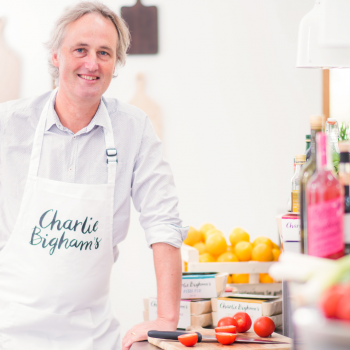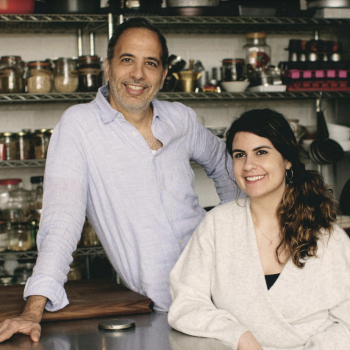Get your immune system Coronavirus ready!

 Lucinda Miller, founder of NatureDoc shares her expertise on how we can boost our immune system and protect ourselves and our family through diet.
Lucinda Miller, founder of NatureDoc shares her expertise on how we can boost our immune system and protect ourselves and our family through diet.
There’s something in the air, and it’s not exactly welcome. Everyone is getting increasingly worried about how Covid-19 will affect us all. Even with strict hand washing routines and self-isolation, it now seems inevitable that most of us will be exposed to Coronavirus at some point.
Who are we worried about the most? We must keep elderly parents safe, as they are at risk of being hit the hardest, however any adults and children with asthma, chronic obstructive pulmonary disease, or poor immunity may also find it tougher and may develop complications too.
Building up a strong and resilient immune system is the key to helping you through, and here are some nutrition tips that might make a difference….
 Zinc is a critical mineral needed to build a healthy immune system and is a key anti-viral mineral. Signs a person may be low in zinc are a loss of sense of smell or taste (think fussy picky eaters in children or narrowing of food choices in teens); a little one who picks up lots of colds and coughs and is slow to grow may be low in zinc too; a time when zinc can dip is during puberty as zinc is needed to form healthy hormones); the elderly also tends to become deficient; and so can people who follow a vegetarian or vegan diet. Others at risk of a zinc deficiency are those who have had gastric surgery, inflammatory bowel disease, sickle cell disease, diabetes, liver disease, kidney disease or alcoholism.
Zinc is a critical mineral needed to build a healthy immune system and is a key anti-viral mineral. Signs a person may be low in zinc are a loss of sense of smell or taste (think fussy picky eaters in children or narrowing of food choices in teens); a little one who picks up lots of colds and coughs and is slow to grow may be low in zinc too; a time when zinc can dip is during puberty as zinc is needed to form healthy hormones); the elderly also tends to become deficient; and so can people who follow a vegetarian or vegan diet. Others at risk of a zinc deficiency are those who have had gastric surgery, inflammatory bowel disease, sickle cell disease, diabetes, liver disease, kidney disease or alcoholism.
The main zinc food source is oysters (!) but you can also get some from day to day foods like meat, dairy products, eggs, shellfish, pulses, seeds and nuts. Supplement up to 10mg per day for small children, 15mg for tweens and up to 25mg daily for adults and teens for a few weeks.
Selenium is needed to fight viruses and if you don’t have enough selenium stores then you will probably be hit harder. Those at risk of a selenium deficiency are those with thyroid problems and so are people who follow a vegetarian or vegan diet. Brazil nuts are the best food source and you can also get small amounts in yellowfin tuna, pork and ham, beef, turkey and chicken. Adults need to either eat four brazil nuts daily or supplement with 400mcg selenium daily, tweens about half of this and a younger child one brazil nut or 150mcg.
 Vitamin A is a key nutrient needed for a healthy immune system. Luckily it is found in lots of day to day orange and yellow foods like carrots, butternut squash, sweet potato, mango, liver and butter. You can boost up by taking some cod liver oil and there tends to be quite a bit of Vitamin A in multivitamin supplements. Maximum 5,000iu for adults, 2,500iu for older kids and 800iu for littlies.
Vitamin A is a key nutrient needed for a healthy immune system. Luckily it is found in lots of day to day orange and yellow foods like carrots, butternut squash, sweet potato, mango, liver and butter. You can boost up by taking some cod liver oil and there tends to be quite a bit of Vitamin A in multivitamin supplements. Maximum 5,000iu for adults, 2,500iu for older kids and 800iu for littlies.
Vitamin C is a nutrient needed by the immune system in fighting off viruses. We can’t make vitamin C ourselves, so we do need to rely on consuming plenty every day. Research is being conducted on ultra-high intravenous doses for treating Coronavirus, and it has been shown to reduce the duration of the common cold. But it is important to realise there’s no evidence it can prevent viruses attacking in the first place. As well as citrus fruit, Vitamin C pops up in surprising foods like parsley, kiwi fruit, red peppers and even the humble spud. If you are supplementing consider 1000mg daily for adults, 500mg daily for older children and 250mg for a younger child.
 Vitamin D is important in producing the antimicrobial proteins that we make to kill viruses and bacteria. Research has shown that it can help avoid respiratory infections. The government recommends supplementing vitamin D for bone health and immunity during the winter, when we aren’t getting any from the sun. Since it’s been raining pretty much non-stop since August, you will probably be low unless you have had some winter sun or taken supplements. If you have not been supplementing then take a maximum of 4,000iu per day for adults and 2,500iu for children.
Vitamin D is important in producing the antimicrobial proteins that we make to kill viruses and bacteria. Research has shown that it can help avoid respiratory infections. The government recommends supplementing vitamin D for bone health and immunity during the winter, when we aren’t getting any from the sun. Since it’s been raining pretty much non-stop since August, you will probably be low unless you have had some winter sun or taken supplements. If you have not been supplementing then take a maximum of 4,000iu per day for adults and 2,500iu for children.
To read a more about how nutrition and lifestyle can help family immunity, head over to Lucinda’s detailed blog
Lucinda Miller is the founder of NatureDoc which offers UK-wide clinics specialising in women’s and children’s nutrition and is the author of The Good Stuff cookbook. She also runs an online health shop www.naturedoc.shop which stocks a large range of immune support food supplements.

RAINBOW QUINOA BURGERS – serves 4
This recipe looks amazing and tastes amazing too. A great way to feed your family the full spectrum of the gut-friendly rainbow veggies in one meal! The burger is vegan and full of protein from the quinoa and calcium from the chia seeds. An immune-boosting winner.
The beetroot slaw is a pretty awesome garnish for all sorts of things and stores in the fridge for over a week. It is vegetarian and I have given an easy dairy-free vegan alternative.
- 100 g Quinoa
- 0.5 Butternut squash (cut into chunks)
- 1 Sweet Potato Peeled and cut into chunks)
- 20 g Chia seeds
- 1 Corn on the cob (raw, & cut off cob)
- 12 Sun-dried tomatoes (finely chopped)
- 1 handful Spinach (roughly chopped)
- 1 handful Kale (spine removed, finely chopped)
- 2 Spring onions (finely chopped)
- Salt and pepper
- Oil (for frying)
- 2 Beetroot (grated)
- 2 Carrots (grated)
- 80 g Spinach (roughly chopped)
- 1 Fennel bulb (chopped)
- 1 small handful Mint (chopped)
- 8 tbsp Plain yoghurt (or Oatly Fraiche or coconut yoghurt)
- 1 tbsp Dijon mustard
- 4 tbsp Apple Cider Vinegar
- 1 squeeze Lemon
-
Heat your oven to 180c
-
Roast the butternut squash for about 20 mins and then and add your sweet potato
-
Cook for a further 20 mins until soft, take out and cool to warm
-
In boiling water add some bouillon or a vegetable stock cube and pour onto the quinoa until it is covered with double the amount of water to quinoa. Bring to the boil and simmer for about 15 mins. Leave to cool.
-
In a bowl place the roasted ingredients in with the others and mix well, add seasoning
-
Make into 130g burgers for adults, or 50g for children. Leave to cool and set.
-
Heat some olive or coconut oil in a pan. Fry on a medium heat, but don’t turn too much. Let them go for five mins before turning. They will fall apart if you fiddle too much.
-
Place all the ingredients into a bowl and mix up. Taste to check for seasoning .
 Please wait while we create your listing....
Please wait while we create your listing....





